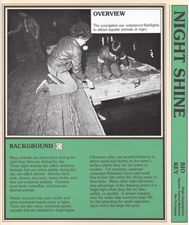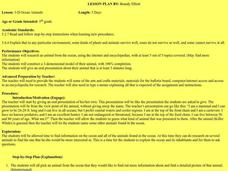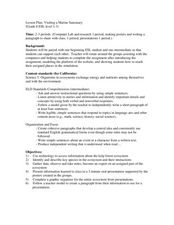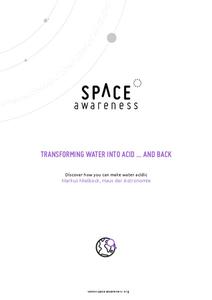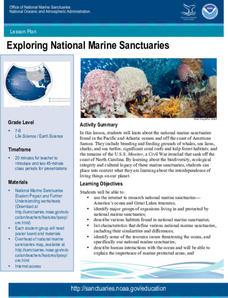NOAA
Watch the Screen!
Can a sponge cure cancer? Life science pupils visit the drugstore under the sea in the fifth lesson of six. Working groups research the topic then get hands-on experience by testing the inhibiting effects of several plant extracts...
Curated OER
Ocean Life: A Heavy Subject
Second graders examine The Learning Page Fact Files about ocean life and categorize the data by weight and group. They distinguish between fish, mammals, and invertebrates and which weigh the most and the least. Students record their...
Curated OER
Night Shine
Students explore aquatic animals that are attracted to light. In this science lesson, students observe how aquatic animals respond to light at night. Students search for aquatic animals in the dark and attempt to catch them. Students...
Curated OER
Week 8 - Sea Life
Using a magnifier, mini marine biologists examine the barbules of a bird feather. They swirl the it into a mixture of oil and water and then re-examine the feather. After the activity, discuss how the oily feathers pose a problem to...
Curated OER
Marine Biology - The Story of Waves
When teaching about the movement of water in the ocean, this PowerPoint will be a terrific support. It covers how waves break and how they are generated. The causes of tides and tsunamis are also detailed. A couple of changes could make...
Australian Geological Survey
Nautiloid Model
At a glance, this cut-out paper model of a nautiloid looks promising. Know, however, that it requires manual dexterity for cutting out neatly and for folding and attaching the tabs. This particular mollusk model is quite difficult to...
Curated OER
3-D Ocean Animals
Fifth graders research an animal from the ocean, using the internet and encyclopedias, with at least 5 out of 5 topics covered. They also construct a 3-dimensional model of their animal and give an oral presentation about their animal...
Curated OER
Visiting a Marine Sanctuary
Students gather information on a kelp forest and identify species in that ecosystem. In this underwater ecosystem lesson plan students gather data, give an oral presentation and create a poster.
American Museum of Natural History
Create a Coral Reef
Scholars create a diorama to showcase a vibrant coral reef. Six steps walk pupils through setting up the diorama box, crafting four different types of marine life, and putting it all together.
Curated OER
What Ocean Animals Do Worksheet
In this ocean animals worksheet, students look at six pictures of ocean animals and then draw a line from each ocean animal to the description that matches it best.
Curated OER
Marine Habitats of Galveston Island
Four lessons introduce elementary ecologists to salt marsh and sandy beach habitats. In the first lesson, they place shells and other materials in vinegar to determine if they contain calcium carbonate. In the second lesson, they read a...
Curated OER
Marine Animals: Stranded on the Coast
Young scholars identify marine animals that could become stranded due to coastal features and currents. They plot data on worksheets for locations of sea turtles actually beached or stranded. After plotting their points, they hypothesize...
American Museum of Natural History
Journey to Deep Sea Vents
Take a deep dive into oceanography. The online interactive allows for learners to board a submersible to dive to the bottom of the ocean to investigate sea vents. On the way down, individuals see different marine life at different...
Curated OER
Aquatic Ecosystems
Students study the diversity of marine life and their habitats. In this aquatic ecosystems activity students complete a lab activity and experiment.
Curated OER
Ocean Animals - Different Worksheet
In this observing the difference worksheet, students look at three pictures of ocean animals to identify the one that is not like the others. Students identify three different ocean animals.
Curated OER
Marine Corps Word Search
In this Marine Corps word search, students identify approximately 40 words and acronyms dealing with the Marines. Topics include names of wars fought, Marine slogans, and names of Marine bases. There are approximately 40 words listed...
Curated OER
Life Science Animal Worksheet
In this animal classification instructional activity, learners examine the 6 pictured animals and categorize them as land animals or marine animals.
Curated OER
Plankton in the Air
Here is a lab activity adequate for use with any full lesson on environmental factors that shape animal adaptations or marine animal characteristics. Pupils will discuss the role plankton plays in the environment and filter-feeding...
Science Matters
Blubber Gloves: It’s All About Insulation
Instill the concept of adaptation with the help of Blubber Gloves—ziplock bags, shortening, and duct tape. Scholars discuss how animals and plants keep warm in polar regions, record their predictions, and try on their Blubber Gloves to...
Space Awareness
Transforming Water Into Acid ... And Back
Greenhouse gases affect marine wildlife in life-threatening ways. Through experimentation, your classes explore the acidification of water from the main greenhouse gas carbon dioxide. As they introduce carbon dioxide to water, a pH...
Curated OER
Looking at Food Chains
In this Looking at Food Chains instructional activity, learners read about a food chain under the sea and underline important information. Next, students fill in a graphic organizer about food chains based on the information they just read.
Curated OER
Ping!
Using "mystery bathymetry" shoeboxes, young explorers simulate sonar action to map out the topography of an un-viewable landscape. This classic activity helps physical oceanography learners understand how sonar works. It would be...
Curated OER
Exploring National Marine Sanctuaries
Young scholars conduct Internet research of the living organisms in national marine sanctuaries, and the resources protected in the sanctuaries. Students gather information about each of the sanctuaries and make an oral presentation and...
Curated OER
Marine Animal and Plant Adaptations
Students examine nature by creating their own animals. In this animal adaptation lesson, students define scientific vocabulary terms dealing with adaptation such as sea stars, sea cucumbers and exoskeleton. Students utilize their...




